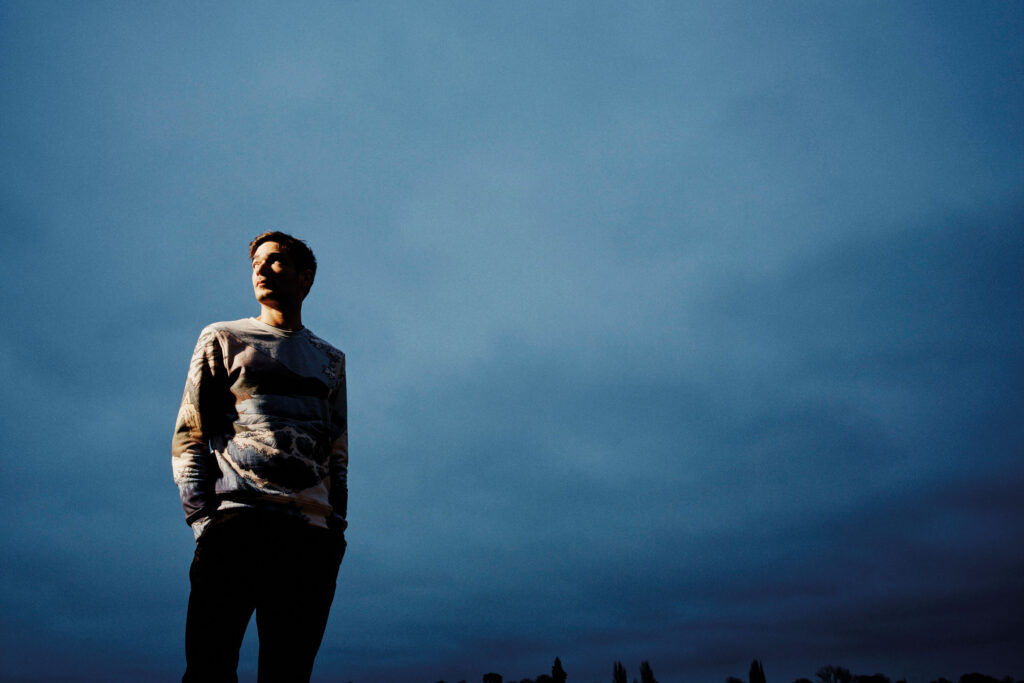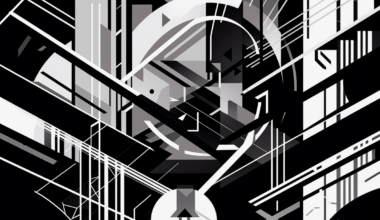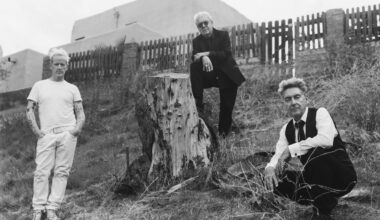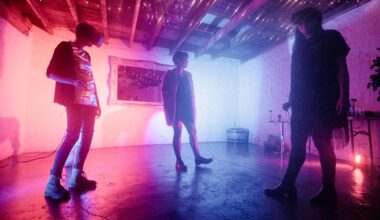The inspiration behind Jon Hopkins’ new album ‘Singularity’ is quite surprising… we talk psychedelic trips in the desert, transcendental meditation on planes, bird watching and wild swimming, oh yes we do
An early spring day brings us to east London in unseasonably intense cold and driving rain. Weaving through nondescript residential streets, we arrive outside a battered looking old building. The address appears to be correct, but from the outside the place looks long abandoned. When Jon Hopkins arrives minutes later, we’re assured that this is indeed his studio, Café Music, and he ushers us inside to an Aladdin’s cave of weird ephemera.
The reception area, away from the music studios themselves, is full of wonderful artefacts and knick-knacks. A theremin sits on a vintage chest of drawers; there are waving cats; Mexican Day Of The Dead rugs; old cameras; wooden-carved mushrooms; a framed painting of David Lynch; a back-lit psychedelic drape: all items people have brought back from trips around the world.
It’s like stepping inside an especially bright, eccentric and engaged mind, as the brain of Jon Hopkins most certainly is. This singular electronic music maker has made eight albums so far (including soundtracks and collaborations with Brian Eno and King Creosote), produced material for Coldplay and London Grammar, and built a huge fanbase on the back of his left-field techno, music that is miles from the mainstream. That he’s done so without compromise is testament to his drive and dedication, and also his individual approach to music creation.
After making tea and offering us some particularly tasty chocolate biscuits, as we settle on the sofa we’re struck by his quiet sense of assurance. Dressed in a red jumper emblazoned with an intricate black and white flower blossom, Hopkins is a composed presence. He’s also incredibly candid, and as we talk it’s apparent that a great deal of thought and energy goes into making his sounds.
His new, ninth album ‘Singularity’ follows 2013’s hugely popular breakout record ‘Immunity’, and carries with it a great deal of expectation. Fans needn’t worry, as it’s an exquisite album, with a new level of intensity and emotional power. Ranging from the ominous bass rumbles and scuffed, swung beats of ‘Everything Connected’ to the quietly redemptive simplicity of piano piece ‘Recovery’, arriving five years after his previous album, ‘Singularity’ is likely to be a defining record for Hopkins.
“People have often said in interviews, ‘Why do you take so long over albums?’,” he says. “It doesn’t feel like I do, it’s just this one seems to be the one that people are waiting for so they notice.”
‘Singularity’ is the result of some profound changes that Hopkins made in his life in the intervening period, and some remarkable experiences that helped shape its sound. Principal among these was his discovery of Transcendental Meditation, which he took up to help banish the stress after incessant touring and live shows around ‘Immunity’.
“I’d experienced very intense studio work before and patches of touring, but we approached nearly 200 live shows for that album,” says Hopkins. “That’s quite a lot for a solo artist. With Transcendental Meditation you can be in any state of mind: you can be frantic after a crazy day; you can be exhausted. It always helps. You can do it on planes. There’s so much travelling and so much waiting around on tour, so learning to meditate is the first thing I would recommend to people.”

In the process of learning this technique, Hopkins tapped a wellspring of creativity. He is convinced that meditation unlocks a store of subconscious ideas.
“What you notice when you do it regularly is that it gives you access to your own creativity,” he says. “In many ways it opens this bottomless vault of your own subconscious. I found that was creeping into the music. It’s one of the reasons the album is much more free structurally.”
The album is full of spine-tingling moments. ‘Emerald Rush’ is a shimmering viridian cascade of synth and piano, which suddenly lifts off as its bass tones hove into earshot, and a shuffling, heavy rhythm transforms it into a hallucinogenic techno mutation. ‘Neon Pattern Drum’ has the gated riffs of trance, but its fractured beats and layered ambient tones suggest something deeper. ‘Singularity’ has lucidity at odds with our fragmented times, a ruminant quality that’s present in the best hypnotic dance music, or ambient at its most contemplative. For Hopkins, Transcendental Meditation offers the opportunity to step out of the maelstrom of constant communication and information online, and to contemplate, take stock.
“We all know that we work better when we’re calm and measured than when we’re aware of how many things we’ve got to do at once,” he says. “We’re in this age of pointless acceleration of everything, and meditation’s a great antidote to that. You can still only do one thing at a time, but our brains are telling us we need to think about these things all at once, because our phones are alerting us.”
Hopkins says that ‘Singularity’ is designed to be heard all in one sitting, antithetical in the age of Spotify playlists. It does benefit from being consumed whole, in the way it navigates from extremity to repose, psychedelia to gentleness.
“The album is a response to that,” says Hopkins. “Whether people listen to it all in one go is none of my business, I have no right to tell people to listen to it the way I want them to, but I have a right to say or point out to people how they should listen to it, in the deepest possible way, from start to finish. It’s counter to the idea that people can only have enough attention to listen to one song by one artist and then it’s onto the next thing in the playlist.”
Jon Hopkins was born in Kingston, Surrey, grew up in Wimbledon, and started his music career early. He studied at London’s Royal College Of Music from the age of 12, and developed a special interest in Ravel and Stravinsky; at 17, he was recruited to play keyboards for singer-songwriter Imogen Heap, before he began to make his own music. In 2001 he released his ambient inflected debut ‘Opalescent’ on Just Music, and with each record since, his renown, not to mention work rate, has dramatically increased.
After the burnout of ‘Immunity’, in addition to starting Transcendental Meditation, Hopkins decided he needed a change of scene. Heading to California to spend time in the desert, he began to experiment with psychedelics. Taking him out of his immediate headspace and filling his mind with distant horizons, new friendships and startling visions. These episodes greatly influenced the sound of ‘Singularity’.
“I needed a change, and to not be here any more, because I’ve made every album in this building,” says Hopkins. “I had to start [the album] somewhere else, at least experience more stuff before starting. I said, ‘I’m going to take some time off and live somewhere else, live in a different climate’. Talking about accessing the subconscious, well, you’ve got to have something in there, you’ve got to go out and have experiences in places beyond where you grew up. I went there and had amazing times, laughed a lot and met loads of amazing new people. It was genuinely very inspiring. I didn’t really do any album recording there, just sketched ideas out without having a studio or anything. But I knew that just by being there, I was triggering the starting points for the record.”
Hopkins is keen to point out that he’s only interested in naturally occurring substances. He tells us about a particularly vivid trip that he wanted to capture and somehow bottle with the sound of ‘Singularity’.
“There was a moment after Coachella festival in 2015, I was in the desert near Palm Springs,” he says. “We’d had some of these psilocybin mushrooms, and I just remember staring up at the sky, it was dawn, and seeing this perfect grid spiralling up. I saw a vulture flying along those lines, and the lines were there first. It was like they were predicting where it was going to fly. It was so beautiful a tear appeared in my eye, and through that tear, all these extra fractal rainbows of light from the sun came over, and I was like, ‘Shit, I’ve got to translate this feeling into music’. It was so magical. I’ve been on a mission to do that since.”

These psychedelic moments are embedded on ‘Singularity’: the album sleeve even depicts a star constellation over a desert dusk, which is shaped like a DMT molecule (the active ingredient in strong natural psychedelics such as ayahuasca). For Hopkins, these substances are not recreational drugs, but a sacrament, something that has been part of human culture and ancestry for thousands of years.
“That’s how they were always taken, they were always revered,” he says. “I found profound truths about myself and what felt like truths about reality, but also loads of inspiration for music.”
The track ‘Luminous Beings’, one of the highlights of the record, is something that Hopkins describes as “a microcosm of the psilocybin experience”. It’s a beautiful, profound piece of techno with a gentle, bubbling bass overlapping electronic melodies and propulsive rhythms, and could well be the best thing he’s made so far. It’s deeply immersive dance music, something Hopkins is passionate about, and which composes a good proportion of his latter albums.
“Dancing is something that is deeply hardwired into us,” he says. “The idea of dancing to a repetitive beat for hours is a tribal thing. It’s a way of tripping out and highly affecting your mood, putting yourself into a different state. It’s funny that whatever you do, whatever steps of evolution society goes through, the most basic things hardwired into us will always find a way out into our current culture.
“That’s what clubbing is, certainly when you’re talking about the more serious clubbing, where it’s not about what you look like. The kind of clubs where they don’t allow phones, basically. It’s a very important state, which is why it’s weird and sad that so many venues are shutting down, because we need that. They’ll just pop up elsewhere, they’ll rise again because you won’t be able to stop that in the same way that you can’t stop exploring different, and maybe higher, states of consciousness.”
The album’s title, ‘Singularity’, Hopkins says, doesn’t refer to Ray Kurzweil’s terrifying premonition of the future, ‘The Singularity Is Near’, where artificial intelligence rules and people’s personalities are uploaded to a hive mind. The ‘Singularity’ Hopkins refers to is the idea suggested by the late Professor Stephen Hawking, who saw the universe as expanding outward from one point before contracting again to the same point. The album begins and ends with the same tone, further reinforcing this idea. Hopkins isn’t particularly interested in technology, seeing his three analogue synths (Korg MS-20, Korg Trinity, Moog Sub Phatty) as simply creative tools.
“I see it all as colours that you’re painting with on a canvas. I like that simplicity and I don’t like getting the newest thing.”
When he’s not consumed by music, Jon Hopkins enjoys typical pursuits, like going to the cinema, spending time with friends. Most of all, he likes the great outdoors: hiking, and particularly wild swimming, something he recently discovered.
“In the sea, lakes, ponds,” he says. “That’s been a life-changing discovery, in really cold water. In the last year I got into that. It’s the Wim Hof Method, which is a breathing method combined with gradual exposure to cold. It will just transform how you feel, it transforms your energy.”
He also enjoys bird watching, and his love of nature inevitably is woven into ‘Singularity’ in the form of field recordings, as it has been on previous records, such as ‘Diamond Mine’ and ‘Immunity’. On the final track of the album, ‘Recovery’, a gorgeous piano piece, the call of the scops owl can be heard if you listen closely; on the self-titled opener ‘Singularity’, there’s the low rumble of thunder, pitched with a sampler to create a sub bass effect.
“To me it’s obvious to include sounds I love and that evoke a certain feeling,” says Hopkins. “There’s always that glorious feeling of excitement and foreboding when you hear thunder, and it’s really loud in the first track, but if you haven’t got a good subwoofer, you probably won’t hear it.”
Live performance has been a key part of getting Hopkins’ music to a wide audience, and it’s something he views as vital and spiritual.
“There’s a lot to be said for that communal experience. I don’t feel like it’s coming from me, I feel that we’re all experiencing it together: all very hippy, but I love that thought.”
As our talk winds to a close with a suitably cosmic sense of synchronicity, Hopkins tells us how much he enjoys what he does.
“To have the freedom to make your own music, that’s the greatest luxury really. It’s amazing.”
Listening to ‘Singularity’, it really shows.
‘Singularity’ is out on Domino






